Lorijo Metz's Blog: ScifiWritermom, page 3
December 19, 2013
Eternal Night, by Jade Kerrion
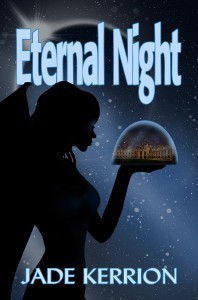
“What makes Kerrion’s writing so compelling is the beautifully flawed characters that find themselves in unexpected relationships…these kind of character level conflicts make Kerrion’s writing so deliciously addictive.”—Noor A Jahangir, Author of The Changeling King
“Everything you want in a great story. Love, intrigue, action, betrayal, and understanding.”—Ch’kara Silverwolf, Author of Daughter of Light and Dark
Alone for a millennium, since a human murdered her beloved consort, Ashra, the immortal icrathari queen, rules over Aeternae Noctis, the domed city of eternal night. Her loneliness appears to be at an end when her consort’s soul is reborn in a human, Jaden Hunter, but their reunion will not be easy.
Icrathari are born, not made. If Ashra infuses Jaden with her immortal blood, he will be a vampire, a lesser creature of the night, a blood-drinker rather than a soul-drinker.
Furthermore, Jaden is sworn to protect his half-sister, five-year-old Khiarra. She is the child of prophecy, destined to end the eternal night and the dominion of the Night Terrors—the icrathari and the vampires.
As Ashra struggles to sustain her crumbling kingdom in the face of enemies without and treachery within, Jaden fights to defend his sister and unravel a greater mystery: what is the city of eternal night, and how did it come to be?
E-books available at Amazon / Amazon UK / Apple / Barnes & Noble / Kobo / Smashwords
Paperbacks available at Amazon / Amazon UK / Barnes & Noble / Book Depository
READ AN EXCERPT
With Tera beside her, Ashra strode forward. A wall of vampires parted to reveal the other two icrathari, Siri and Elsker. A dark-haired human slumped at Elsker’s feet, his wrists cuffed behind his back. Ashra stifled a chuckle. Surely Tera was overreacting; the human was by far the weakest creature in the chamber.
Tera knelt down, wrapped her fingers into the human’s hair, and pulled his head back. The human’s face was handsome enough—the slash of his cheekbones accentuated his perfectly proportioned, sculptured features—but taken as a whole, he was not compelling enough to justify the fuss.
Ashra shrugged. “You’re wasting my time, Tera.”
Apparently undeterred, the icrathari warlord shook the human hard. His eyes flashed open. They were brilliant green, the exact color of the emerald ring Ashra wore on the index finger of her right hand. His gaze was unfocused, and the reflexive narrowing of his eyes matched the clenching of his jaw, hinting of wrenching pain.
Tera looked up and met Ashra’s gaze. “Taste his soul.”
Ashra recoiled, her upper lip curling in disgust. She had no desire to taste a human’s soul. Over the centuries, humans had grown weak, their small lives consumed by superstition and fear. It was better to live on the edge of perpetual starvation than fill her hunger with the pitiful excuse humans called a soul.
“Go deep,” Tera said.
But why? Ashra’s brow furrowed. She glanced at Siri and Elsker, but the two icrathari shrugged, apparently no more clued in than she was. She looked back at Tera. The icrathari warlord known as Ashra’s Blade was the epitome of calm understatement. If she was so insistent, she must have had a reason.
Ashra knelt beside the human. Without flinching, she placed her hand against his muscled abdomen. It was bloody, his flesh ripped by a vampire’s talons.
The man tensed at her touch, and his eyes flared wide with agony when her soul-sucking powers leeched into him. His breath came hard and fast, his chest heaving with the effort as he twisted in Tera’s unyielding grip, trying to break free.
Ashra’s eyes narrowed. The human was weakened—tapped into his life source, she waded through his dazed thoughts and shivered from the echo of each spasm of pain that wracked his body—but still, he fought Tera on the physical plane and Ashra on the psychic dimension, denying her access to his memories and to his soul.
She frowned and slammed her will against his, tearing an anguished scream from his throat, but still, his will did not crumble.
Askance, Ashra looked at Tera. “Did you taste him?”
Tera nodded. “It wasn’t hard the first time; he didn’t know what to expect, but apparently, he does now and is doing a fine job of fighting back.”
Was that grudging respect she heard in Tera’s voice? “Does his soul really matter?”
The icrathari nodded again.
Ashra’s shoulders shifted with the motion of a silent sigh. His resistance left her with little choice. She leaned forward and glided her lips over his in a whisper of a kiss.
Human myths spoke of succubi and incubi—demons that, with a touch, could stir lust in their unwilling victims. All myths were based in reality. The maddening beauty and soul-sucking powers of the icrathari had spawned the legends of succubi and incubi. With a touch, the icrathari could lure their victims into a state of sexual ecstasy, bending the will and baring the soul.
The human tensed against Ashra, resisting the intimate contact. She almost recoiled. Had the centuries dulled her innate powers? Surely she had not forgotten how to lure a man.
She closed her eyes and remembered love.
As always, Rohkeus’s fine-featured face—those beautiful gold-flecked green eyes, so unusual for an icrathari, and teasing smile—came to the fore. With a dreamy half-smile, she deepened the kiss, driving the memory of love before her like a sharpened stake.
At last, the man relaxed, succumbing to the kiss. She leaned into him, heedless of his crimson blood staining her white gown. He was warm, feverish even. Just skimming over six feet, he had more than twelve inches on her, but his physical strength, compared to hers, was puny. She was well aged; over four millennia old, she was the oldest of the icrathari and the strongest. She could have broken his neck with as little effort as a human child snapping a twig.
Her hand trailed across his muscled torso. He made it easy for her to be gentle. His body trembled as if he longed for her. His mouth was hungry for her kiss. He arched up against her, as if craving more. His need was like a living creature, wild and aching for her touch.
Eyes closed, Ashra shivered. Only one other person had desired her as much.
And he was dead.
She forced her way through the memories of pale bodies tangled upon cool silk sheets. When her soul-sucking power leeched out, it found no opposition. Images of the human’s life rewound in a blaze of vivid sights, sounds, and sensations.
Ashra looked up at Tera, her smile little more than a barely perceptible curve of her lips. “He fancies himself the protector of the child of prophecy. Was she among those taken tonight?”
Tera nodded.
Ashra chuckled, the sound without humor. “It’s a pity her genetic heritage wasn’t sufficiently superior to prevent her from being culled.”
“There’s more. Go deep.”
She pushed past the blackness at the start of his memories, expecting deeper darkness. Instead, the colors shifted into shades of ochre and gray. Memories, older than his body, resided in his soul; memories of an Earth long since lost to them—a planet surrounded and nourished by water; images of tall buildings glistening beneath a benevolent sun, and of thriving cities filled with the bustle of humans; memories of quiet and intimate conversations beneath a silver moon, the same silver moon that now graced Malum Turris with its light, though a thousand years older and viewed only from beneath the protection of the dome.
She saw herself as he must have seen her, a much-younger icrathari, still hopeful for the future, never realizing that the Earth they had all known and loved was irretrievably lost. Had she ever looked that vulnerable? Had her smile ever been so beautiful, so filled with love as she looked upon—
“Rohkeus?” Oh, blessed Creator, was that stricken whisper her voice?
~*~
E-books available at Amazon / Amazon UK / Apple / Barnes & Noble / Kobo / Smashwords
Paperbacks available at Amazon / Amazon UK / Barnes & Noble / Book Depository
Connect with Jade Kerrion at: Website / Facebook / Twitter / Amazon
Filed under: Book Discussions Tagged: Arts, Ashra, Jade Kerrion, Online Writing, SuperNatural, Tera, Tera Patrick, Vampires








December 3, 2013
And the winners are…
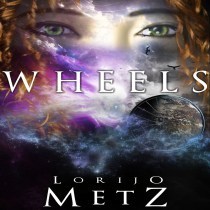
A little late, nevertheless, the winners of my “Four Chances To Win” contest are:
1st place - Judy: Judy wins an audible, an ebook (mobi or epub) and a signed paperback edition of WHEELS.
Yeh Judy !!!!
2nd & 3rd - Kellie and Tim: Kellie and Tim win an audible and an ebook (mobi or epub) edition of WHEELS.
Yeh Kellie and Tim !!!
4th place: Ryan: Ryan wins an audible edition of WHEELS.
Woo Who Ryan!!
I’ll be contacting the winners by email soon. Thank you to everyone who entered. Still don’t own a copy of WHEELS? Look for December discounts coming your way soon!
Lorijo
Filed under: Contest, Musings Tagged: Amazon Kindle, Audiobook, Devil, E-book, Facebook, Mobipocket, Multiple choice, None of the above








November 20, 2013
Talking Tribble: My Fascination with Alien words—and Where The Heck Are The Bathrooms?

A few years ago, I showed my daughter, who was then in 8th grade, a page from my 8th-grade diary. Written in 19—never mind the year—my diary entry for Feb. 27th began thus:
“If I could have any wish I wanted it would be to go to the land of Narnia. Some days I sit and think of ways I could get there. Now if I were to read this 10 years later I would think to myself what is this land of Narnia?”
Needless to say, I had an aversion to commas. And, truthfully, my future self can still picture Narnia perfectly in her much older head. Anyway…
My daughter’s reaction was not to laugh, but rather to look at me seriously, and with a fair amount of pity say, “Oh, mom, you wouldn’t last a day in my school.” (Honestly, had it not been for the safe haven of the drama department, I wouldn’t have lasted a day in my high school.)
The reason I bring this up is that a month ago I agreed to write a post for Sci-fi month that addressed my fascination with alien languages. (No, not the ones they speak across the border; rather, the ones they use on the other side of the universe. i.e. Klingon.)
[image error]A fascination that began post-Narnia, but was initiated by its very same author, C.S. Lewis, in his science fiction trilogy known as the Ransom or Cosmic Trilogy series. Long before I realized Klingon was a language (decades before I attended my first production of The Klingon Christmas Carol) I discovered the Malacandrian Language spoken by the Hross in Out of the Silent Planet, the first book of Lewis’ science fiction series. For whatever reason (Who knows what was going on in my 16-year-old mind) I was so fascinated by this made up (but then isn’t all language made up?) alien language, I painstakingly made my own glossary and taped it inside the book.
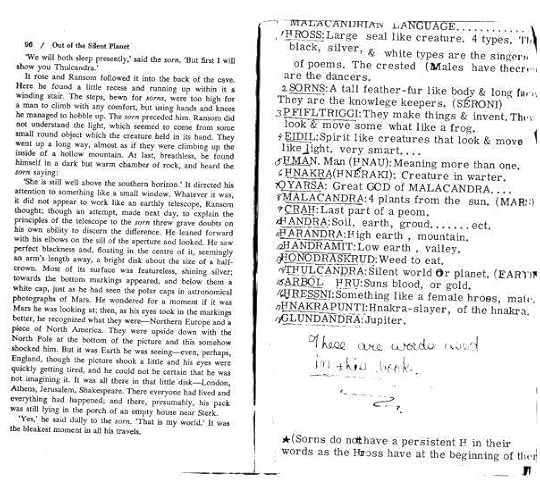
I love that I wrote, “These are words used in this book.”
When I look back and try to analyze my fascination, I realize it has little to do with the language. Rather, when I read a science fiction book in which humans end up communicating with alien creatures, my imaginative, yet highly organized and (though some might argue against this) rational mind needs to understand two things. One, how do creatures from other planets understand each other (i.e. the universal translators of Star Trek) and two, what words, or ideas would not be translatable—and therefore require the use of an alien word?
I also wonder about the bathrooms. Think of it—different planets, different body parts—would human space travelers even be able to use alien bathrooms?
Fast forward several years, and I have written my own science fiction novel. Much like C.S. Lewis, I am not a linguist, but I have included a glossary because, well, honestly, there were some Circanthian (and Tsendi) words which, to my reasoning, defy translation.
I also included a toilet scene. I couldn’t help myself.
In the electronic edition of WHEELS, the first time each alien word is used, you can simply click on it and link straight to the glossary (and from the glossary back to the page). The paperback edition also includes the glossary, but sad to say, the glossary did not make it into the audible edition. Never fear, however, nerd that I am (I mean, was) I’m prepared to help you with this. Simply click on Kirk and his tribbles to download your own PDF copy of the glossary, free of charge.
 You’re welcome. By the way, if you read this post, you’re probably a nerd. Happy Sci-fi month! (And T-Metz… Happy 26th Wedding Anniversary. Love you! xoxooxo)
You’re welcome. By the way, if you read this post, you’re probably a nerd. Happy Sci-fi month! (And T-Metz… Happy 26th Wedding Anniversary. Love you! xoxooxo)
The post Talking Tribble: My Fascination with Alien words—and Where The Heck Are The Bathrooms? appeared first on LJ Metz.
Talking Tribble: My Fascination with Alien Languages—and Where The Heck Are The Bathrooms?
This might surprise some of you (or not…probably not), but I was pretty much a nerd in middle school and high school (as opposed to the super cool person I am now).  A few years ago, I showed my daughter, who was then in 8th grade, a page from my 8th grade diary. Written in 19—never mind the year—my diary entry for Feb. 27th began thus:
A few years ago, I showed my daughter, who was then in 8th grade, a page from my 8th grade diary. Written in 19—never mind the year—my diary entry for Feb. 27th began thus:
“If I could have any wish I wanted it would be to go to the land of Narnia. Some days I sit and think of ways I could get there. Now if I were to read this 10 years later I would think to myself what is this land of Narnia?”
Needless to say, I had an aversion to commas. And, truthfully, my future self can still picture Narnia perfectly in her much older head. Anyway…
My daughter’s reaction was not to laugh, but rather to look at me seriously, and with a fair amount of pity say, “Oh, mom, you wouldn’t last a day in my school.” (Honestly, had it not been for the safe haven of the drama department, I wouldn’t have lasted a day in my high school.)
The reason I bring this up is that a month ago I agreed to write a post for Sci-fi month that addressed my fascination with alien languages. (No, not the ones they speak across the border; rather, the ones spoken on the other side of the universe. i.e. Klingon.) A fascination that began post Narnia, but was initiated by its very same author, C.S. Lewis, in his science fiction trilogy known as the Ransom or Cosmic Trilogy series. 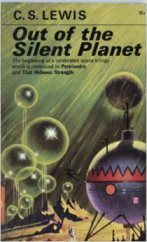 Long before I realized Klingon was a language (decades before I attended my first production of The Klingon Christmas Carol) I discovered the Malacandrian Language spoken by the Hross in Out of the Silent Planet, the first book of Lewis’ science fiction series. For whatever reason (Who knows what was going on in my 16-year-old mind) I was so fascinated by this made up language, I painstakingly made my own glossary and taped it inside the book.
Long before I realized Klingon was a language (decades before I attended my first production of The Klingon Christmas Carol) I discovered the Malacandrian Language spoken by the Hross in Out of the Silent Planet, the first book of Lewis’ science fiction series. For whatever reason (Who knows what was going on in my 16-year-old mind) I was so fascinated by this made up language, I painstakingly made my own glossary and taped it inside the book.
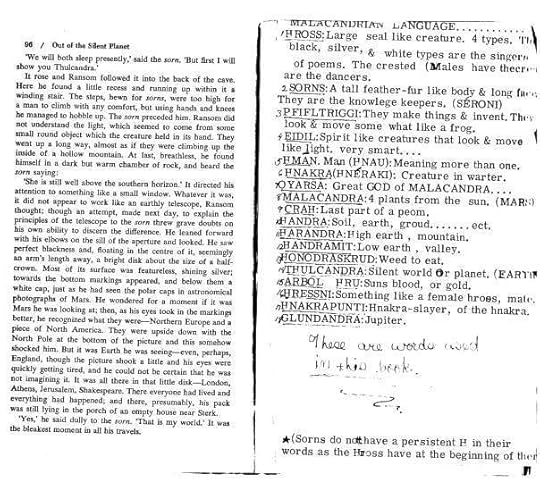
I love that I wrote, “These are words used in this book.”
When I look back and try to analyze my fascination, I realize it has little to do with the language. Rather, when I read a science fiction book in which humans end up communicating with alien creatures, my imaginative, yet highly organized and (though some might argue against this) rational mind needs to understand two things. One, how do creatures from other planets understand each other (i.e. the universal translators of Star Trek) and two, what words, or ideas would not be translatable—and therefore require the use of an alien word?
I also wonder about the bathrooms. Think of it—different planets, different body parts—would human space travelers even be able to use alien bathrooms?
Fast forward several years, and I have now written my own science fiction novel. Much like C.S. Lewis, I am not a linguist, but I have included a glossary because, well, honestly, there were some Circanthian (and Tsendi) words, which to my reasoning, defied translation.
I also included a toilet scene. I couldn’t help myself.
In the electronic edition of WHEELS, the first time each alien word is used, you can simply click on it and link straight to the glossary (and from the glossary back to the page). The paperback edition also includes the glossary, but sad to say, the glossary did not make it into the audible edition. Never fear, however, nerd that I am (I mean, was) I’m prepared to help you with this. Simply click on Kirk and his tribbles to download your own PDF copy of the glossary, free of charge.
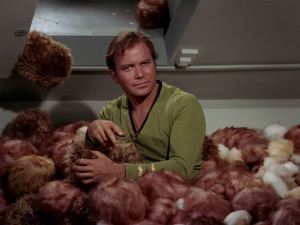 You’re welcome. By the way, if you read this post, you’re probably a nerd. Happy Sci-fi month! (And T-Metz… Happy 26th Wedding Anniversary. Love you! xoxooxo)
You’re welcome. By the way, if you read this post, you’re probably a nerd. Happy Sci-fi month! (And T-Metz… Happy 26th Wedding Anniversary. Love you! xoxooxo)
Filed under: Musings, Searching4Meaning Tagged: Alien languages, CS Lewis, Hross, Klingon, Klingon Christmas Carol, Malacandrian Language, Narnia, Out of the Silent Planet, science fiction, Star Trek, The Chronicles of Narnia: The Lion the Witch and the Wardrobe, Wheels








November 11, 2013
Dreamscapes At The End Of Time – Building The Universe Of Thumb, by John Guy Collick
The inhabitants of Collick’s universe not only live on this colossal body of God, they are also its architects and builders. The title, Thumb, refers to God’s thumb and is a physical location much like a mountain or a river. For my part, I believe it is one of the most unusual worlds I’ve ever run across. Moreover, as November is Sci-fi month, I wrote to Mr. Collick and asked if he’d be willing to write a guest post based on a couple of questions I posed.
Lucky me—lucky you—he graciously agreed. Here then, are his answers…
What inspired you to write your novel, Thumb; and what sources, if any, influenced your creation?
John Guy Collick: The idea for Thumb came to me in a dream many, many years ago. I saw a colossal mannequin lying on its back in the desert, and a man in blue robes standing in front. Millions of people had been making this giant puppet for hundreds of years, the plan was that it would come to life and save them from a dreadful catastrophe. As time went by they forgot the original purpose and ended up in-fighting amongst themselves – Head against Hand, Heart against Shoulder etc. Every time I revisited the idea the body got bigger until, in Thumb, it stretches half a million miles from head to toe, and floats on a flat singularity at the end of the universe, when all the suns and planets are dead.
The basic premise is that all the remaining sentient races in the cosmos are being carried to the next universe by their gods. For whatever reason, humanity has no gods left and is therefore frantically building their own immense Frankenstein’s monster from fragments brought out of the past. Once it’s complete it will come to life and carry the last few people into the new universe. There is a strong Gothic theme to the series. The Gothic novels of 18th-century writers like Ann Radcliffe introduced the idea of an unknowable cosmos littered with immense fragments of the past. The wonderful Carceri (Prisons) of Giovanni Battista Piranesi capture this perfectly. When I’m describing the interior of the body of God in the sequel to Thumb, Ragged Claws, I draw heavily on his imagery.
[image error]
Carceri d’invenzione by Giovanni Battista Piranesi (1750)
I’ve also always been a big fan of early 20th century absurdist and fantastical writing, particularly authors like Franz Kafka and Mervyn Peake (in fact the city of Metacarpi is based on Kafka’s Prague).The idea behind the universe is fundamentally surreal. Like the characters in Kafka’s books, the people in Thumb live in a universe without logic marked by infinite landscapes and layers upon layers of mystery, but very few of them ever question the essential strangeness of their situation. Interestingly, a couple of readers initially assumed that I’d written a religious novel, which is not the case. None of the humans at the end of time worship the God or are in any way religious, it’s just a being they’ve been told they have to make in order to survive.
[image error]
Ruth’s flyer from THUMB
Modernist writing can be difficult and obscure, especially when the author emphasizes the surreal nature of their story through the language itself. I wanted to write about a Kafka-esque universe, but in the form of a straightforward high-octane adventure novel, I like to think of it as Kafka meets Indiana Jones. I’m also a huge fan of British New Wave Science Fiction, especially the baroque fantasies of Michael Moorcock and the urban wildernesses of J. G. Ballard. The universe of Thumb, with its infinite spaces of concrete, rusted machinery, iron, and dust, owes a lot to Ballard’s disaster novels – especially The Drought (1964) and The Terminal Beach (1964). In the latter is a short story called ‘The Drowned Giant’ in which an immense corpse is washed up on a beach, and just treated as an interesting curio by the locals before it decays into nothing. No-one questions why it’s there or where it’s come from, its presence is accepted, in the same way, that very few people actually wonder about the God they are building in Thumb. Ballard’s stories took their imagery from British urban landscapes in the 1960s and 1970s, where I grew up – post-boom concrete jungles littered with decay set between un-reconstructed bomb sites from the Second World War. I’ve tried to retain a Modernist/Expressionist vibe in the artwork I’m creating for the book.
[image error]
The mysterious house from the first chapter of Thumb
As an avid science fiction reader, what science fiction or fantasy worlds stand out in your memory as exceptionally unique?
John Guy Collick: The two fantasy landscapes from novels that have stayed with me more than any others are the world of Mervyn Peake’s Gormenghast Trilogy, and the future Earth of William Hope Hodgson’s The Night Land.
The Gormenghast Trilogy stands out as one of the most peculiar set of novels ever written in the UK. Mervyn Peake was a war artist who started writing the first book, Titus Groan, as therapy following a nervous breakdown. In the stories, a set of outrageously grotesque characters live in the vast sprawling castle of Gormenghast, an infinite chaotic mass that combines just about every conceivable architectural style. The day to day routine of the inhabitants is bound by ancient and meaningless ritual which dictates their every waking moment. There’s very little plot in the first novel – by the end the eponymous hero, Titus, is still an infant – but the evocation of this insanely baroque world is stunning. Peake describes both architecture and people by layering description on description, exaggerating details to the point where they virtually take on a life of their own. It’s like reading Dickens on Acid. In typically grotesque fashion people are often described as if they were things, and objects take on the characteristics of people.
[image error]
Mervyn Peake’s own illustrations for the manuscript of Titus Groan
The second book, Gormenghast, is slightly more conventional (only just) in that it describes the rise of evil within the castle in the form of the renegade servant Steerpike. By the time Peake wrote the third book, Titus Alone, he was already suffering from the illness that would eventually claim his life. It’s very sketchy, really more of an outline than a book, but it still captures an utterly strange universe filled with exaggerated characters and meaningless landscapes. Peake was one of the first war artists to enter the concentration camps towards the end of World War Two and the overwhelming image in the book is of a world populated by dispossessed wanderers lost in the shadow of an impersonal factory of evil. Michael Moorcock was also immensely influenced by Peake, directly in his two novels The Golden Barge (1958) and Gloriana or the Unfulfill’d Queen (1978).
[image error]
The Night Land illustrated by Peter A. Jones
The bulk of William Hope Hodgson’s The Night Land is set in the distant future when the sun has died and the Earth is locked in perpetual night. The last remnants of humanity huddle in a pyramid fortress called the Great Redoubt, while all around them gather strange monsters and beings, most of whom seek to destroy man. The novel tells of the hero’s quest to rescue the lone survivor of the Lesser Redoubt which has been overwhelmed by the creatures of the wilderness, and so he has to journey through a landscape built straight out of a nightmare. Sadly the book is virtually unreadable because Hodgson chose to write it in the style of a 17th-century religious tract, and so the language is very archaic, repetitive and overblown. If you stick with it, however, he builds up a wonderfully creepy world populated with sinister, incomprehensible entities. Most of these are merely hinted at – the Country of the Great Laughter, the Thing that Nods, giants glimpsed in clouds of light or engaged in unknown tasks by immense red pits and kilns. Surrounding the Great Redoubt are the Great Watchers, beings that have slowly approached the fortress over centuries and now sit and stare at it with an obviously malignant intent that is never fully explained. The Night Land stands out as a forgotten classic of Science Fantasy, and if you can wade through the turgid prose and glacial pace it leaves you with images that can haunt you for years.
[image error]
A caravan makes its way over the skin of the colossus in Ragged Claws.
[image error]
Coming soon
I’ve just finished the first draft of the second book in the series, Ragged Claws, and I’m hoping to release it early next year. At the moment the plan is for four novels in total. The third is called Antihelix – the title for the fourth is, as yet, undecided.
I can hardly wait for the release of Ragged Claws. If you haven’t read Thumb–do so! Also, if you enjoyed this post, you can read more by the author at: John Guy Collick, on and on I sped into futurity…
Purchase Thumb at the following links:
Amazon US Amazon UK Smashwords Paperback
Check back next Tuesday when the topic will be: Talking Tribble—My Fascination With Alien Languages, Customs & Where The Heck Are The Bathrooms?
The post Dreamscapes At The End Of Time – Building The Universe Of Thumb, by John Guy Collick appeared first on LJ Metz.
Dreamscapes At The End Of Time – Building The Universe Of Thumb
 John Guy Collick’s novel, Thumb, takes place on what its characters literally consider the body of God. More specifically on, “A flat singularity (carrying) the unfinished body of God through an empty universe.” The inhabitants of Collick’s universe not only live on this colossal body of God, they are also its architects and builders. The title, Thumb, refers to God’s thumb and is a physical location much like a mountain or a river. For my part, I believe it is one of the most unusual worlds I’ve ever run across. Moreover, as November is Sci-fi month, I wrote to Mr Collick and asked if he’d be willing to write a guest post based on a couple of questions I posed.
John Guy Collick’s novel, Thumb, takes place on what its characters literally consider the body of God. More specifically on, “A flat singularity (carrying) the unfinished body of God through an empty universe.” The inhabitants of Collick’s universe not only live on this colossal body of God, they are also its architects and builders. The title, Thumb, refers to God’s thumb and is a physical location much like a mountain or a river. For my part, I believe it is one of the most unusual worlds I’ve ever run across. Moreover, as November is Sci-fi month, I wrote to Mr Collick and asked if he’d be willing to write a guest post based on a couple of questions I posed.
Lucky me—lucky you—he graciously agreed. Here then, are his answers…
What inspired you to write your novel, Thumb; and what sources, if any, influenced your creation?
John Guy Collick: The idea for Thumb came to me in a dream many, many years ago. I saw a colossal mannequin lying on its back in the desert, and a man in blue robes standing in front. Millions of people had been making this giant puppet for hundreds of years, the plan was that it would come to life and save them from a dreadful catastrophe. As time went by they forgot the original purpose and ended up in-fighting amongst themselves – Head against Hand, Heart against Shoulder etc. Every time I revisited the idea the body got bigger until, in Thumb, it stretches half a million miles from head to toe, and floats on a flat singularity at the end of the universe, when all the suns and planets are dead.
The basic premise is that all the remaining sentient races in the cosmos are being carried to the next universe by their gods. For whatever reason humanity has no gods left, and is therefore frantically building their own immense Frankenstein’s monster from fragments brought out of the past. Once it’s complete it will come to life and carry the last few people into the new universe. There is a strong Gothic theme to the series. The Gothic novels of 18th century writers like Ann Radcliffe introduced the idea of an unknowable cosmos littered with immense fragments of the past. The wonderful Carceri (Prisons) of Giovanni Battista Piranesi capture this perfectly. When I’m describing the interior of the body of God in the sequel to Thumb, Ragged Claws, I draw heavily on his imagery.
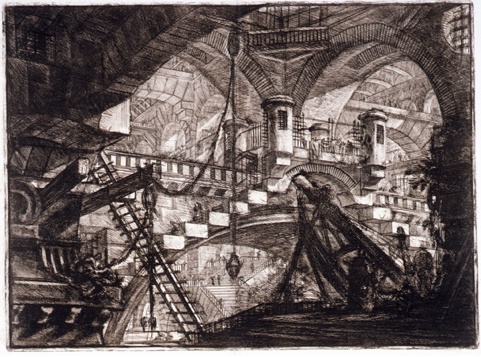
Carceri d’invenzione by Giovanni Battista Piranesi (1750)
I’ve also always been a big fan of early 20th century absurdist and fantastical writing, particularly authors like Franz Kafka and Mervyn Peake (in fact the city of Metacarpi is based on Kafka’s Prague).The idea behind the universe is fundamentally surreal. Like the characters in Kafka’s books the people in Thumb live in a universe without logic marked by infinite landscapes and layers upon layers of mystery, but very few of them ever question the essential strangeness of their situation. Interestingly, a couple of readers initially assumed that I’d written a religious novel, which is not the case. None of the humans at the end of time worship the God or are in any way religious, it’s just a being they’ve been told they have to make in order to survive.

Ruth’s flyer from THUMB
Modernist writing can be difficult and obscure, especially when the author emphasises the surreal nature of their story through the language itself. I wanted to write about a Kafka-esque universe, but in the form of a straightforward high-octane adventure novel, I like to think of it as Kafka meets Indiana Jones. I’m also a huge fan of British New Wave Science Fiction, especially the baroque fantasies of Michael Moorcock and the urban wildernesses of J. G. Ballard. The universe of Thumb, with its infinite spaces of concrete, rusted machinery, iron and dust, owes a lot to Ballard’s disaster novels – especially The Drought (1964) and The Terminal Beach (1964). In the latter is a short story called ‘The Drowned Giant’ in which an immense corpse is washed up on a beach, and just treated as an interesting curio by the locals before it decays into nothing. No-one questions why it’s there or where it’s come from, its presence is accepted, in the same way that very few people actually wonder about the God they are building in Thumb. Ballard’s stories took their imagery from British urban landscapes in the 1960s and 1970s, where I grew up – post-boom concrete jungles littered with decay set between un-reconstructed bomb sites from the Second World War. I’ve tried to retain a Modernist/Expressionist vibe in the artwork I’m creating for the book.
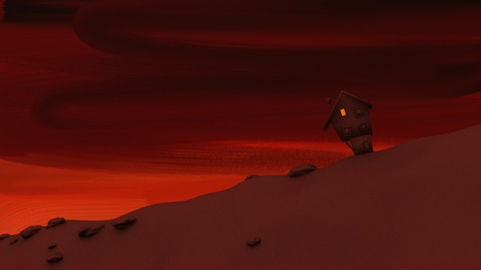
The mysterious house from the first chapter of Thumb
As an avid science fiction reader, what science fiction or fantasy worlds stand out in your memory as exceptionally unique?
John Guy Collick: The two fantasy landscapes from novels that have stayed with me more than any others are the world of Mervyn Peake’s Gormenghast Trilogy, and the future Earth of William Hope Hodgson’s The Night Land.
The Gormenghast Trilogy stands out as one of the most peculiar set of novels ever written in the UK. Mervyn Peake was a war artist who started writing the first book, Titus Groan, as therapy following a nervous breakdown. In the stories a set of outrageously grotesque characters live in the vast sprawling castle of Gormenghast, an infinite chaotic mass that combines just about every conceivable architectural style. The day to day routine of the inhabitants is bound by ancient and meaningless ritual which dictates their every waking moment. There’s very little plot in the first novel – by the end the eponymous hero, Titus, is still an infant – but the evocation of this insanely baroque world is stunning. Peake describes both architecture and people by layering description on description, exaggerating details to the point where they virtually take on a life of their own. It’s like reading Dickens on Acid. In typically grotesque fashion people are often described as if they were things, and objects take on the characteristics of people.
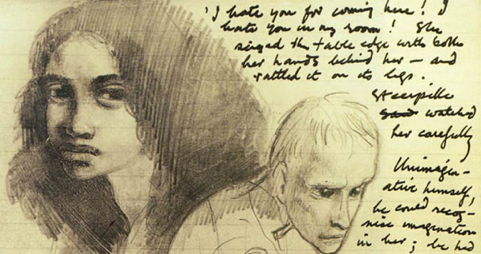
Mervyn Peake’s own illustrations for the manuscript of Titus Groan
The second book, Gormenghast, is slightly more conventional (only just) in that it describes the rise of evil within the castle in the form of the renegade servant Steerpike. By the time Peake wrote the third book, Titus Alone, he was already suffering from the illness that would eventually claim his life. It’s very sketchy, really more of an outline than a book, but it still captures an utterly strange universe filled with exaggerated characters and meaningless landscapes. Peake was one of the first war artists to enter the concentration camps towards the end of World War Two and the overwhelming image in the book is of a world populated by dispossessed wanderers lost in the shadow of an impersonal factory of evil. Michael Moorcock was also immensely influenced by Peake, directly in his two novels The Golden Barge (1958) and Gloriana or the Unfulfill’d Queen (1978).

The Night Land illustrated by Peter A. Jones
The bulk of William Hope Hodgson’s The Night Land is set in the distant future when the sun has died and the Earth is locked in perpetual night. The last remnants of humanity huddle in a pyramid fortress called the Great Redoubt, while all around them gather strange monsters and beings, most of whom seek to destroy man. The novel tells of the hero’s quest to rescue the lone survivor of the Lesser Redoubt which has been overwhelmed by the creatures of the wilderness, and so he has to journey through a landscape built straight out of a nightmare. Sadly the book is virtually unreadable because Hodgson chose to write it in the style of a 17th century religious tract, and so the language is very archaic, repetitive and overblown. If you stick with it, however, he builds up a wonderfully creepy world populated with sinister, incomprehensible entities. Most of these are merely hinted at – the Country of the Great Laughter, the Thing that Nods, giants glimpsed in clouds of light or engaged in unknown tasks by immense red pits and kilns. Surrounding the Great Redoubt are the Great Watchers, beings that have slowly approached the fortress over centuries and now sit and stare at it with an obviously malignant intent that is never fully explained. The Night Land stands out as a forgotten classic of Science Fantasy, and if you can wade through the turgid prose and glacial pace it leaves you with images that can haunt you for years.

A caravan makes its way over the skin of the colossus in Ragged Claws.
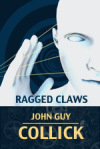
Coming soon
I’ve just finished the first draft of the second book in the series, Ragged Claws, and I’m hoping to release it early next year. At the moment the plan is for four novels in total. The third is called Antihelix - the title for the fourth is, as yet, undecided.
I can hardly wait for the release of Ragged Claws. If you haven’t read Thumb–do so! Also, if you enjoyed this post, you can read more by the author at: John Guy Collick, on and on I sped into futurity…
Purchase Thumb at the following links:
Amazon US Amazon UK Smashwords Paperback
Check back next Tuesday when the topic will be: Talking Tribble—My Fascination With Alien Languages, Customs & Where The Heck Are The Bathrooms!
Happy Writing!
Filed under: Book Discussions Tagged: Classic Science Fiction, Franz Kafka, Gloriana, Gormenghast, Gormenghast Trilogy, John Guy Collick, Mervyn Peake, Michael Moorcock, Ragged Claws, Thumb, Titus Groan, William Hope Hodgson








November 8, 2013
Four Chances To Win!!!
“Christmas came early for me this year – Wheels is an incredible sci-fi adventure novel! And I enjoyed reading it. A lot! It’s just so amazing! Well done, Lorijo.
“
So, even though it’s Sci-fi Month, and I already had my blog posts planned, I’m adding a giveaway into the mix to celebrate my good fortune.
In other words, my good fortune could be yours!
To enter, all you have to do is go to my Contact page (or Click Here), enter your email and in the comment section tell me the name of your favorite science fiction or fantasy book. (And don’t forget to click Submit) Do this by midnight (EST) on November 30th and you’ll be entered in the giveaway. I’ll choose four winners (using random.org) and here’s what they’ll get:
1st place: An audible, an ebook (mobi or epub) and a signed paperback edition of WHEELS
2nd & 3rd place: An audible and an ebook (mobi or epub) edition of WHEELS
4th place: An audible edition of WHEELS
On December 2nd I’ll email the winners! Good luck 
P.S. On November 13th, check out my interview with Ara on My Book and my Coffee
Filed under: Check Out The Reviews, Contest Tagged: Adventure science fiction, Ara, Arts, Audible, Audiobook, Book, Contest, Free audio book, Free Books, Lorijo Metz, My Book and my coffee, science fiction, Wheels








November 4, 2013
How Did A Nice Girl Like Me End Up With An Alien Like You? It’s Sci-fi Month
Throw an alien in the pot and add some spaceships to that parade! [image error]
As some of you know, I like science fiction. (Maybe my twitter name gave it away?) Anyway, I’m not a scientist, nor did I grow up with geeks. In fact, I grew up in an artsy-fartsy family full of musicians, photographers and—drama! While I spent plenty of hours watching the Robinson family while they were Lost in Space, I spent many more hours dancing around the house to Johann Strauss’ Blue Danube waltz or singing along with songs composed by the likes of Rogers and Hammerstein
OMG! I just realized—I’m a Glee girl!
Why, then, do all my fictitious ramblings involve aliens?
My first picture, Floridius Bloom and the Planet of Gloom, takes place on another planet (The planet of Gloom, Obviously… although it’s really a lovely little planet populated with starshines and wigglyfluffs). My first novel, WHEELS, involves H.G. Wells and, well, another planet. And, while the novel I’m currently writing takes place on Earth… it’s not exactly this Earth, but rather Urth and, well…it’s complicated.
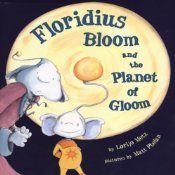
Narrated by Bryan Kennedy
The truth is, I like both science fiction and fantasy, though science fiction that is not too hardcore and fantasy that is not too full of fairies—especially fairy princesses.
Disney help me—I don’t like fairy princesses!
[image error]I believe my obsession with aliens started with C.S. Lewis and Narnia; which, though fantasy, led me to read his Perelandra series—definitely science fiction. Next, came the Hobbit. I know, I know…once again it’s fantasy; but, while I was making my way through Middle Earth, my father and brothers were watching the original Star Trek series on TV. The men in my family may have moved on from Star Trek, while I’ve managed to become a fan of every Star Trek incarnation since.
In the meantime, if you love Science Fiction and want more ways to celebrate, check out the following list of bloggers participating in Sci-fi Month:
Rinn @ Paper and Pixels
Atmika @ Stalking Books
Emma @ Never Judge A Book By It’s Cover
Annie @ Books – A Novel Idea
Charlene @ Bookish Whimsy
Sarah @ Exploring All Genres
Andrea @ Little Red Reviewer
Kritika @ Snowflakes & Spider Silk
Nara @ Looking for the Panacea
Sana @ Artsy Musings of a Bibliophile
Mary @ The Holy Tangent
Ara @ My Book and My Coffee
KJ @ Worlds in Ink
Jayd @ Books, Food & Other Things
Stephan @ stephanloy.com
Amy @ Ode to Jo and Katniss
Mark @ Walker of Worlds
Aloi @ Guiltless Reading
Kristen @ Fantasy Book Cafe
William @ Roads Go Ever, Ever On
Grey Wolf @ Alternate History Fiction
Dan @ Terra Cognition
Jorie @ Jorie Loves a Story
Shannon @ Novel Reflection
Renay @ Lady Business
Megan @ Adrift on Vulcan
Maria @ Maria’s Mélange
Darlene @ Sci-fi Fantasy Readers
Stormy @ Book. Blog. Bake.
Samantha @ Celestial Carousel
Noel @ Blue Fox Fables
Celine @ Nyx Book Reviews
Lorijo @ LJMetz.com
The post How Did A Nice Girl Like Me End Up With An Alien Like You? It’s Sci-fi Month appeared first on LJ Metz.
How Did A Nice Girl Like Me End Up With An Alien Like You?
Throw an alien in the pot and add some spaceships to that parade!
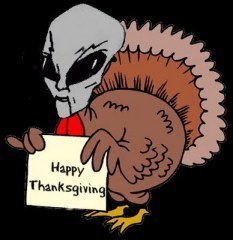
As some of you know, I like science fiction. (Maybe my twitter name gave it away?) Anyway, I’m not a scientist, nor did I grow up with geeks. In fact, I grew up in an artsy-fartsy family full of musicians, photographers and—drama! While I spent plenty of hours watching the Robinson family while they were Lost in Space, I spent many more hours dancing around the house to Johann Strauss’ Blue Danube waltz or singing along with songs composed by the likes of Rogers and Hammerstein
OMG! I just realized—I was a Glee girl!
Why, then, do all my fictitious ramblings involve aliens? My first picture, Floridius Bloom
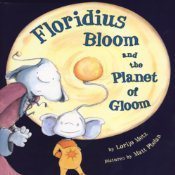
Narrated by Bryan Kennedy
and the Planet of Gloom, takes place on another planet (The planet of Gloom, Obviously… although it’s really a lovely little planet populated with starshines and wigglyfluffs). My first novel, WHEELS, involves H.G. Wells and, well, another planet. And, while the novel I’m currently writing takes place on Earth… it’s not exactly this Earth, but rather Urth and, well…it’s complicated.
The truth is, I like both science fiction and fantasy, though science fiction that is not too hardcore and fantasy that is not too full of fairies—especially fairy princesses.
Disney help me—I don’t like fairy princesses!
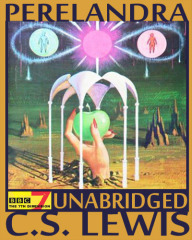 I believe it started with C.S. Lewis and Narnia; which, though fantasy, led me to read his Perelandra series—definitely science fiction. Next, came the Hobbit. I know, I know…once again it’s fantasy; but, while I was making my way through Middle Earth, my father and brothers were watching the original Star Trek series on TV. The men in my family may have moved on from Star Trek, but I managed to become a fan of every Star Trek incarnation since.
I believe it started with C.S. Lewis and Narnia; which, though fantasy, led me to read his Perelandra series—definitely science fiction. Next, came the Hobbit. I know, I know…once again it’s fantasy; but, while I was making my way through Middle Earth, my father and brothers were watching the original Star Trek series on TV. The men in my family may have moved on from Star Trek, but I managed to become a fan of every Star Trek incarnation since.
For me, the genres of science fiction and fantasy aren’t about aliens or dwarves, they’re about imagination and escape. My best friend’s favorite book involves a depressed boy setting himself on fire. I’d rather escape the pain of everyday and read a story about a boy who can control fire! Sure, science fiction and fantasy are often dark, but at least that darkness is far, far away in another galaxy.
Most important—the spaceships (or wizards) that take you there are really cool!
So anyway, mark you calendar: November is Sci-fi Month. Then, check back next Tuesday for an interview with science fiction author and blogger, John Guy Collick. We’ll be discussing his new novel Thumb, one of the most imaginative pieces of world building I’ve read in a light year. J
In the meantime, if you love Science Fiction and want more ways to celebrate, check out following list of bloggers participating in Sci-fi Month:
Rinn @ Rinn Reads
Atmika @ I Talk Books!
Emma @ Never Judge A Book By Its Cover
Rebekah @ Reflections of a Bookworm
Annie @ Books – A Novel Idea
Charlene @ Bookish Whimsy
Sarah @ Exploring All Genres
Kirsty @ Be More Book
Laura @ Music Plus Books
Andrea @ Little Red Reviewer
Brittany @ Close Encounters of the Book Kind
Kritika @ Snowflakes & Spider Silk
Tory @ The Sleeping Latte
Chrys @ Oh, Chrys!
Nara @ Looking for the Panacea
Sana @ Artsy Musings of a Bibliophile
Alix @ A Novel Idea
Mary @ The Holy Tangent
Ara @ My Book and My Coffee
KJ @ Worlds in Ink
Jayd @ Books, Food & Other Things
Leanne @ Literary Excursion
Stephan @ stephanloy.com
Chris @ The Ace of Clouds
Amy @ Ode to Jo and Katniss
Mark @ Walker of Worlds
Aloi @ Guiltless Reading
Kristen @ Fantasy Book Cafe
William @ Two Weeks from Everywhere
Grey Wolf @ Alternate History Fiction
Dan @ Terra Cognition
Kelley @ Another Novel Read
Lianne @ Caffeinated Life
Jorie @ Jorie Loves a Story
Shannon @ Novel Reflection
Renay @ Lady Business
Lorijo Metz (aka ScifiWriterMom) @ lorijometz.com
Megan @ Adrift on Vulcan
Maria @ Maria’s Mélange
Darlene @ Sci-fi Fantasy Readers
Stormy @ Book. Blog. Bake.
Samantha @ Celestial Carousel
Sandra @ sandraulbrichalzaman.com
Noel @ Blue Fox Fables
Faith @ Student Spyglass
Celine @ Nyx Book Reviews
Kezia @ Chapteriosity
Lisa @ Over The Effing Rainbow
Anna @ Tokyo Jupiter
Related articles
SciFi November (moustacheonthemoon.wordpress.com)
Great Science Fiction Resources (costumesupercenter.com)
Finding Humanity in Alien Eyes (psychologytoday.com)
Filed under: Musings Tagged: Arts, C.S. Lewis, Earth, Fantasy, Hobbit, November, Perelandra, science fiction, Science Fiction Month, Star Trek, Star Trek: The Original Series, Thumb, Wheels, YA Science Fiction








October 28, 2013
So You Think You Have What It Takes To Narrate An Audiobook?
Think you have what it takes to narrate an audio book—maybe even your own book? Let’s hear what actress and professional voiceover artist Lauren Baldwin has to say. (By the way, Lauren just recently wrapped up the audio production of my novel, WHEELS!)
Hi Lauren. First, I want to thank you for doing such an awesome job narrating WHEELS. I’ve acted in several plays and honestly thought I might one day narrate WHEELS myself. However, as an avid audiobook listener, I can attest that when it comes to audiobooks, the quality of the narration will make or break a book every bit as much as the writing. While I do have some voice training, in the end I decided that managing 16 difference characters throughout an entire novel was, well—WAY beyond my reach! With that in mind, can you tell my readers in what way narrating a book is different (more or less difficult) from acting in a movie or a play?
 Well, unless you’re Eddie Murphy, it’s rare that you get to play all the characters in a story. That alone is a thrilling experience! It can be difficult on a technical level, remembering which characters had which accent, tone etc., as well as making sure that they are distinctive enough that when it comes down to a solid conversation between characters with little narrative, the audience still knows who is saying what. As with acting in a play or movie, a lot of research and development goes into each character. I think the main difference though is the creative freedom that comes with narrating an audiobook that you don’t get on stage or screen. Had this been a movie, I wouldn’t get to play the roles of Principal Provost or James Wu, but hidden behind a microphone I get to play everyone!
Well, unless you’re Eddie Murphy, it’s rare that you get to play all the characters in a story. That alone is a thrilling experience! It can be difficult on a technical level, remembering which characters had which accent, tone etc., as well as making sure that they are distinctive enough that when it comes down to a solid conversation between characters with little narrative, the audience still knows who is saying what. As with acting in a play or movie, a lot of research and development goes into each character. I think the main difference though is the creative freedom that comes with narrating an audiobook that you don’t get on stage or screen. Had this been a movie, I wouldn’t get to play the roles of Principal Provost or James Wu, but hidden behind a microphone I get to play everyone!
When recording for a company like Amazon’s ACX, what technical skills (i.e. recording equipment or programs) do you need?
 I have a professional microphone and stand, a Kindle to read the book on, and a free recording and editing software program called Audacity. With these key pieces in place, it really comes down to the production skills I have after that. Recording is fairly straightforward, but the editing takes the most time. The producer has to be careful to get the timing correct throughout and must also eliminate breaths and other unwanted noises without clipping words short or making them sound unnatural.
I have a professional microphone and stand, a Kindle to read the book on, and a free recording and editing software program called Audacity. With these key pieces in place, it really comes down to the production skills I have after that. Recording is fairly straightforward, but the editing takes the most time. The producer has to be careful to get the timing correct throughout and must also eliminate breaths and other unwanted noises without clipping words short or making them sound unnatural.
The audition script I created for WHEELS included three different scenes. One featured the main character, because that “voice” was the most important to me. Another featured several characters, because I wanted to see how well the auditioning artist could switch between multiple characters. Finally, one featured a diary entry, because it specifically required a British accent. I think it was smart of me to include the three difference scenes in my audition script. (Imagine me patting myself on the back here.) What other skills and/or talents would you recommend someone look for when auditioning voiceover talent?
 Yes, it was a fantastic idea to include all of those characters. It’s always a shock when an author gives you an audition piece, then makes you an offer, then you read the book and find there are several difficult accents required throughout! Especially if you can’t do them! So, I would advise authors to always include sections with difficult accents or voices. Or at least make a note somewhere in the description that they are in there. I think the main thing to look for is that central voice, the heart of the book. As you said, capturing McKenzie was key to this book’s narrative as she is the protagonist.
Yes, it was a fantastic idea to include all of those characters. It’s always a shock when an author gives you an audition piece, then makes you an offer, then you read the book and find there are several difficult accents required throughout! Especially if you can’t do them! So, I would advise authors to always include sections with difficult accents or voices. Or at least make a note somewhere in the description that they are in there. I think the main thing to look for is that central voice, the heart of the book. As you said, capturing McKenzie was key to this book’s narrative as she is the protagonist.
Now that WHEELS is wrapped up and ready to go (i.e. ACX says it’s heading to retail, which means it will available for sale on iTunes, Amazon and Audible.com soon!) what’s on your plate? More audiobooks? More plays? A movie starring Lauren Baldwin and Colin Firth? ( No romance, please, he’s too old for you!) In short, what’s next for Lauren Baldwin?
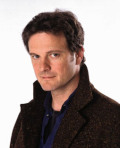 Yes, I’m excited to start promoting Wheels! It’s an incredible story and I’m tremendously proud to be a part of it. Other than frequent trips back to England to see Colin (Sorry, there’s no age limit when it comes to Mr. Darcy!), I will be mostly working on a new feature film; a thriller from director/producer Mark Pirro called Rage of Innocence. When that wraps up, I will be heading into pilot season and hopefully pick up a few more TV roles. I would love to do another audiobook before then and I’m currently auditioning for a several on ACX.
Yes, I’m excited to start promoting Wheels! It’s an incredible story and I’m tremendously proud to be a part of it. Other than frequent trips back to England to see Colin (Sorry, there’s no age limit when it comes to Mr. Darcy!), I will be mostly working on a new feature film; a thriller from director/producer Mark Pirro called Rage of Innocence. When that wraps up, I will be heading into pilot season and hopefully pick up a few more TV roles. I would love to do another audiobook before then and I’m currently auditioning for a several on ACX.
(I love this commercial starring Lauren!)
One final question (this one’s for me!): What was your favorite scene, character or moment to narrate in WHEELS? Where there any scenes or characters that you believe stretched your skill as a narrator?
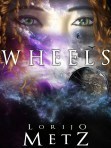 Oh my goodness, Professor Revolvos for sure! I loved performing his voice; I imagined it to be a little like Alan Rickman. I also had a lot of fun with the minor characters such as Ms. Chantos, Grandma Mir and Rooney. The Tsendi were a challenge, as I wanted them to sound completely different to the soft-spoken Circanthians. The gruffness I gave them was a new experience for me as a narrator.
Oh my goodness, Professor Revolvos for sure! I loved performing his voice; I imagined it to be a little like Alan Rickman. I also had a lot of fun with the minor characters such as Ms. Chantos, Grandma Mir and Rooney. The Tsendi were a challenge, as I wanted them to sound completely different to the soft-spoken Circanthians. The gruffness I gave them was a new experience for me as a narrator.
My favorite scenes were any that involved Revolvos and Provost bickering. They were so well written and a joy to perform.
I did find the final scenes difficult to narrate. The emotions came easy to me in the characters of McKenzie and James but going from the heavily emotional speech back to neutral narration was a challenge. I wanted to just sob my way through the entire ending! (In a good way!!)
That wraps up my interview with Lauren Baldwin. With WHEELS coming out on audio, I’m looking for bloggers or readers who would be interested in listening to and posting a review on iTunes, Audible and Amazon. I will have a limited number of free copies for review. If you are interested, please contact me at: coffeewriter at me dot com.
Related articles
Vocal Casting to Begin For the Audiobook “Secrets of the Plumed… (prweb.com)
Calling an audible: An indie author’s audiobook adventure (headfirstintothedeepend.typepad.com)
Filed under: Musings Tagged: Alan Rickman, Amazon.com, audible.com, Audiobook, Colin Firth, Darcy, Eddie Murphy, iTunes, Lauren Baldwin, Lorijo Metz, Mark Pirro, Science Fiction Audio book, Wheels, Young adult













